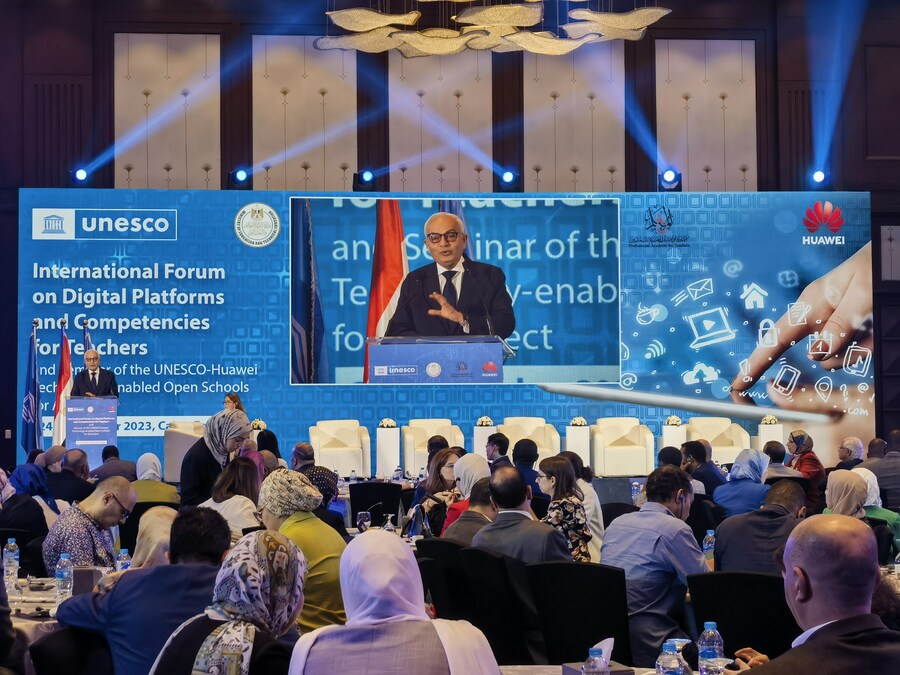At the UNESCO-Huawei International Forum on Digital Platforms and Competencies for Teachers, Egypt’s Ministry of Education unveiled the National Distance Learning Centre for the Continuous Professional Development of Educators, a pivotal component of the UNESCO-Huawei Technology-enabled Open Schools for All (TeOSS) project.
This collaborative project, running from 2020 to 2023 in Egypt, Ghana, and Ethiopia, aims to revolutionise education through digital means.
Read also: Egypt, KOICA to catalyse educational advancement of BST
Egypt’s Ministry of Education Commends UNESCO and Huawei
Dr. Reda Hegazy, Minister of Education and Technical Education, commended UNESCO and Huawei for selecting Egypt as a partner in the Open Schools Project. He recognized the significant achievements of the Open Schools project in Egypt, emphasising the importance of capacity building, enriching training courses for teachers, digital platforms, and the establishment of the National Center for Distance Education. This comprehensive approach seeks to enhance the skills of educators across the country.
Technology-Enabled Open Schools for All (TeOSS) in Action
TeOSS, implemented in partnership with the ministries of education in Egypt, Ethiopia, and Ghana, is a transformative initiative that is piloting and testing digital education platforms in these nations. The project includes training in digital skills for teachers and students, the development of policy frameworks for digital education, and the evaluation of its effectiveness. Ultimately, the aim is to scale out TeOSS to other African countries, thereby making quality education accessible.
One of the project’s successes in Egypt is the training of 300 teachers in digital skills, and the newly launched National Distance Learning Centre will further strengthen distance learning and digital literacy for 950,000 K-12 educators in underserved communities. This holistic approach is vital to bridging educational gaps and ensuring equal access to quality education.
Advancing Digital Learning Competencies and Access
Sobhi Tawil, Director of the Future of Learning and Innovation Team at UNESCO, emphasised the role of the Ministry of Education in Egypt in supporting future education. He acknowledged Huawei’s longstanding commitment to improving digital learning competencies through the TECH4ALL initiative. The project has significantly enhanced the quality of education, increased access, and promoted digital transformation in Egypt, Ethiopia, and Ghana. Egypt’s launch of the National Center for Distance Education marks a significant step toward digital transformation.
TECH4ALL: A Commitment to Inclusive Digital Education
Huawei’s participation in the TeOSS project aligns with its TECH4ALL initiative, a long-term commitment to digital inclusion and sustainability. Under the umbrella of TECH4ALL, the education domain focuses on developing tech-driven solutions that contribute to UN Sustainable Development Goal 4: ensuring inclusive and equitable quality education and promoting lifelong learning opportunities for all.
Joyce Liu, Director of the TECH4ALL Digital Inclusion Program Office for Huawei, highlighted the importance of improving digital skills for educators, especially in Egypt, to address the educational challenges. She emphasised the need to collaborate in building a more inclusive and sustainable digital world through education.
Huawei, UNESCO Partner for seeds for the future program in Africa, Asia
A Forum for Digital Learning Advancements
The two-day UNESCO-Huawei International Forum on Digital Platforms and Competencies for Teachers served as a platform for discussing best practices in digital education. It explored strategies for building digital platforms, enhancing educator capabilities, and facilitating international resource-sharing and collaboration. The forum brought together government ministers, senior representatives from Egypt, Ethiopia, and Ghana, UNESCO and Huawei representatives, TeOSS partners, and international experts.
The launch of the National Distance Learning Centre and the ongoing TeOSS project underscore the commitment to advancing education through digital means, making quality learning accessible to all.
Meanwhile, Huawei and UNESCO had in March announced their joint commitment towards enhancing education in Africa and Asia through the use of technology in future programs. This DLI project is hence a testament to their continued focus and actualisation of their commitment.




